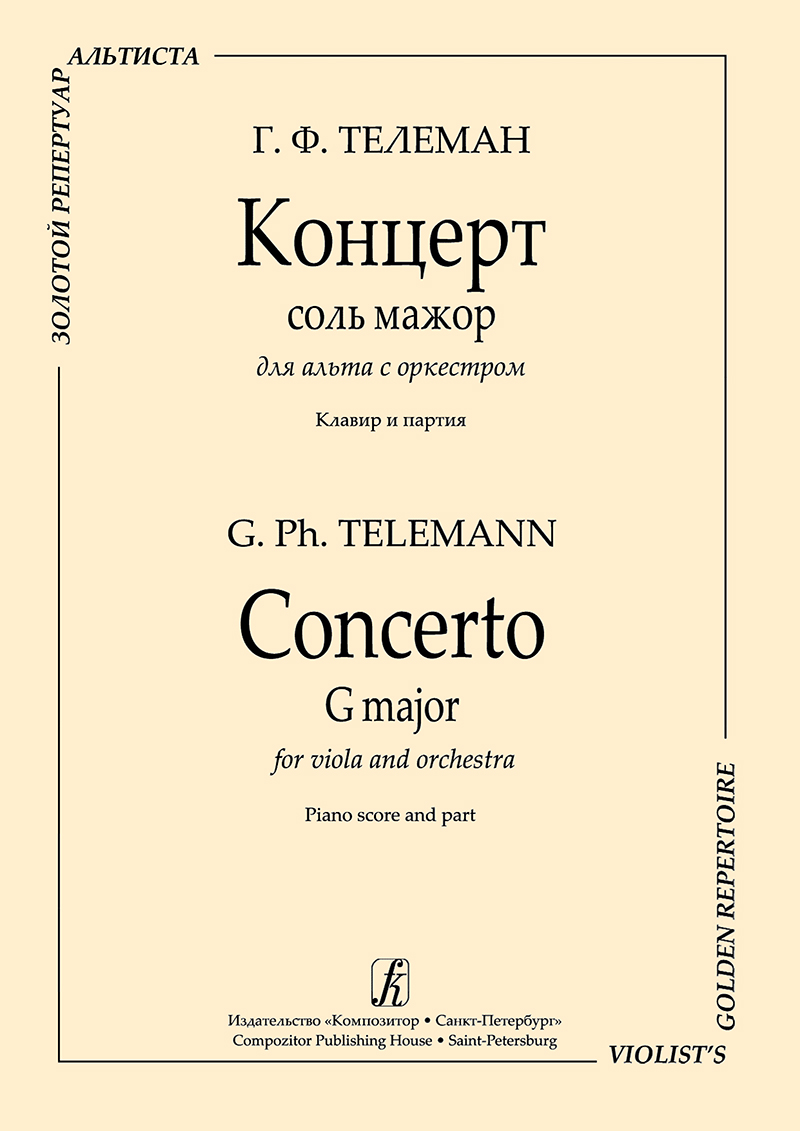
Telemann G.-Ph. Concerto G major for viola and orchestra. Piano score and part
- Author:
- Telemann G.-Ph.
- Author (full):
- Georg Philipp Telemann
- Title (full):
- Series “Violist's Golden Repertoire”. Concerto G major for viola and orchestra. Arranged for viola and piano. Editor of the series — Alexey Lyudevig. Piano score and part
- Number of pages:
- 16+8
The Compozitor Publishing House • Saint-Petersburg offers your attention the series “Violist’s Golden Repertoire”, edited by the distinguished musician and teacher Alexey Vladimirovich Lyudevig.
Alexey Vladimirovich Lyudevig is the graduate of the Leningrad Conservatoire, where he studied at professor A. G. Sosin, founder of viola class in Leningrad.
Since 1960, after finishing the Conservatoire and postgraduate programme, A. Lyudevig started teaching at the Leningrad Conservatoire, bringing up the generation of excellent musicians.
A. Lyudevig has been working over 50 years in the world famous Philharmonic orchestra, conducted by Ye. Mravinsky and later by Yu. Temirkanov. During the years in the orchestra, the Laureate of the National Competition A. Lyudevig repeatedly played as the soloist, contributing as the first performer of many classical compositions as well as masterpieces of the 20th century music by P. Hindemith, B. Britten, W. Walton, B. Bartók, J. Williams, B. Martinů, D. Milhaud, A. Schnittke and others.
Lyudevig was the first at the world stage to perform a lot of works of the Leningrad composers such as V. Tsytovich, D. Finko, G. Firtich, G. Korchmar and many others.
A lot of compositions have been recorded on vinyl and CDs at the Leningrad studio “Melodiya” and released in Russia, Japan, Germany and in the US.
The introduced series “Violists’ Golden Repertoire” includes the substantial compositions of the world musical heritage. Georg Philipp Telemann (1681–1767) started music practice at the cantor of the city school. Playing already many instruments, he did not get systematic music education. Later he took lessons by Caspar Calvör.
In 1701–04 Telemann studied law in the University of Leipzig taking active part in music life of the city: he created student orchestra (later led by J. S. Bach), composed operas for the city theatre, performing tenor parts in them, conducted performances, played organ in one of the churches, composed Cantatas for Thomaskirche — central city church, where later J. S. Bach served as a cantor. In 1704–12 Telemann worked as a Kapellmeister; in 1712–21 — as cantor and music director in Frankfurt-on-Main, where he led music meetings of the society “Zum Frauenstein”. Since 1721 to the end of his life (June 1767) Telemann lived in Hamburg, where he worked as a cantor and a teacher. Here Telemann’s music organizational work was placed on a particularly wide footing. Georg Philipp Telemann organized music society. Many concerts were promoted by him with many outstanding musicians to have participated in them, including J. S. Bach. He made for the opening of the first Special concert hall in Germany in 1761. Telemann’s singular long trip to Paris in 1737 brought success to his compositions, being performed and published.
G. Ph. Telemann belonged to J. S. Bach and G. Ph. Händel’s generation, friendly communicated with them, especially with Bach’s family. Freely managing by the technique of the polyphonic writing, he created compositions in all the music genres, existing that time. His instrumental music acquired most importance in his creative work and got popularity because of its close connection with the melodies of everyday life.
It’s impossible to list all Telemann’s compositions in the short introduction. Here is only the part of it: more than 40 operas (saved only 7), Passions (saved only 7), 23 cycles of the sacred cantatas, oratorios, more than 700 songs, 3 cycles of the “Drinking Music”, about 600 orchestral suites (saved 126), 170 Concertos for solo instruments, quartets, ensembles, 36 Fantasias for piano, many fugues, 12 Fantasias for violin without accompaniment etc.
Among this great quantity of works there is nowhere mentioned the lonely remarkable Concerto for viola and piano, indisputably composed by Telemann, to which we are calling your attention by this publication.
- Author
- Telemann G.-Ph.
- Author (full)
- Georg Philipp Telemann
- Title (full)
- Series “Violist's Golden Repertoire”. Concerto G major for viola and orchestra. Arranged for viola and piano. Editor of the series — Alexey Lyudevig. Piano score and part
- Number of pages
- 16+8

